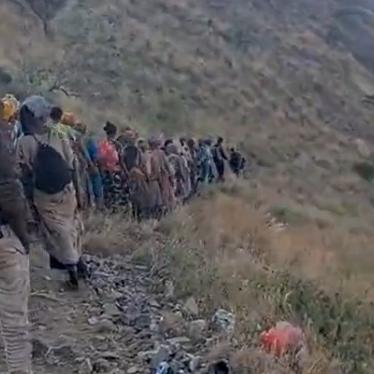Less than a year after Human Rights Watch found Saudi border guards had committed widespread and systematic killings of Ethiopian migrants on its border with Yemen, the US appears poised to lift its years-long ban on the sale of offensive weapons to the country.
The ban would be ended despite the lack of accountability for the Saudis' years of war crimes in Yemen, possible crimes against humanity on the Yemen-Saudi border, and what a US intelligence report concluded was approval of killing the journalist Jamal Khashoggi by Mohammed bin Salman, Saudi Arabia's crown prince and de-facto ruler. This would prove to the Saudi leadership that they can get away with murder.
The ban on US sales of offensive weapons to Saudi Arabia originated from a Joe Biden campaign promise to "make sure America does not check its values at the door to sell arms or buy oil," citing the Saudi-backed war in Yemen.
Last summer, we released a report detailing Saudi border guards' horrific crimes against unarmed Ethiopian migrants. Among the devastating evidence, a 17-year-old boy told us how he survived an explosive weapons attack on the border between Saudi Arabia and Yemen. While approaching the border with a large group of migrants, he said Saudi border guards fired on them with rocket launchers.
He described seeing the remains of his group—mostly women and children—strewn across the mountain. Somehow, he survived the attack but was then intercepted by Saudi border guards. The next part was hard for him to tell. He said that the border guards forced him to rape another survivor—a 15-year-old girl. He witnessed border guards summarily executing a man who refused to rape her, leaving him with the unconscionable choice of his own death or raping the girl.
The news that Saudi border guards were murdering groups of unarmed migrants horrified people from Brazil to South Korea. Diplomats and politicians spoke out, some calling for an independent investigation. The UN's senior-most human rights official noted the killings in his opening address at the September Human Rights Council session. The United States and Germany announced they had ended training and financial support of the Saudi border guard force.
Fast forward 10 months and the momentum has not so much stalled as reversed. What's worse, this comes amid news that the US may soon resume offensive weapons sales to Saudi Arabia.
Despite an initial wave of concern from the international community, there has been no justice or accountability for the killings we documented, nor evidence that the killings have subsided. This is not the first time Saudi Arabia has successfully skirted accountability for grave crimes.
Between 2015 and 2022, Saudi-led coalition airstrikes in Yemen caused nearly 20,000 civilian casualties. For years, Human Rights Watch documented the Saudi-led coalition's use of US weapons in some of the most devastating unlawful attacks on civilians in Yemen, including attacks on a market and a funeral in 2016 that killed nearly 100 people each, both apparent war crimes.
And yet Saudi Arabia has continued to avoid accountability for scores of unlawful airstrikes and civilian casualties in Yemen. In October 2021, after an aggressive lobbying campaign by Saudi Arabia and the United Arab Emirates, the UN Human Rights Council rejected the renewal of the mandate for the Group of Eminent Experts—the only international, impartial, and independent body investigating and reporting on conflict-related rights violations and abuses in Yemen.
As news that Saudi Arabia and the US are nearing agreement on a new mutual defense pact, concern and alarm for grave crimes committed by the Saudis appears long forgotten. Without accountability these crimes will continue. With a new defense pact and the intention of lifting the ban on the sale of offensive weapons, the Biden administration sends the message that heinous crimes can be committed, even rewarded, for political expediency.
As Human Rights Watch researchers we made a promise to people like the 17-year-old boy that we would tell the world their stories and try to persuade those in charge that brutal crimes like mass killings should not go unpunished.
The Biden administration should maintain its ban on offensive weapons and end arms sales to Saudi Arabia until the country takes meaningful, independently verified steps to end their abuses and hold those responsible for war crimes to account. The Biden administration also should move to apply Leahy Laws and similar standards against providing military aid to abusive entities that would suspend US equipment, arms, and training for units involved in grave human rights abuses in Saudi Arabia and anywhere else US assets are used to commit war crimes and crimes against humanity.








